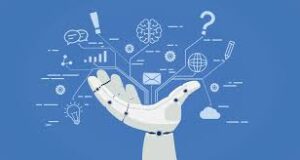How B2B Tech Companies Can Leverage AI to Accelerate Sales and Marketing
Meta Description:
Discover how AI is transforming B2B sales and marketing. Learn strategies, tools, and best practices B2B tech companies can use to boost conversions and customer engagement.
In a rapidly evolving digital economy, artificial intelligence (AI) is no longer a futuristic concept—it’s a transformative tool reshaping the way B2B companies sell and market their products. For businesses in the technology sector, integrating AI into sales and marketing strategies is not just an opportunity—it’s a competitive necessity.
In this article, we explore how AI is revolutionizing B2B sales and marketing, highlight key benefits, and provide actionable tips to help you implement AI in your own business operations.
Why AI Matters for B2B Tech Companies
Artificial intelligence is helping B2B companies gain deeper insights into customer behavior, automate repetitive tasks, and improve decision-making. While B2C brands were early adopters, B2B tech companies are now realizing the immense value of AI-driven tools across the entire customer lifecycle—from lead generation to customer retention.
According to a recent Salesforce report, 84% of B2B marketers using AI have seen improved marketing efficiency, while 79% report increased sales productivity.
5 Ways AI Is Transforming B2B Sales and Marketing
1. Predictive Lead Scoring
AI uses historical data to predict which leads are most likely to convert. By analyzing behavior patterns, CRM interactions, and engagement metrics, predictive lead scoring helps your sales team focus on high-value prospects, increasing conversion rates and reducing wasted effort.
Tip: Integrate AI-powered tools like HubSpot or Salesforce Einstein to automate lead prioritization in real-time.
2. Hyper-Personalized Marketing Campaigns
Gone are the days of generic email blasts. AI enables B2B marketers to segment audiences more precisely and deliver personalized content based on user behavior, company size, industry, and stage in the buyer’s journey.
SEO Keyword Tip: Use keywords like AI in B2B marketing, personalized B2B campaigns, and AI-based marketing automation naturally throughout your blog and metadata.
3. Chatbots and Conversational AI
AI-powered chatbots provide 24/7 support, answer common queries, and qualify leads—all without human intervention. For B2B companies, this means faster response times and improved customer experience.
Bonus: Integrating chatbots on landing pages has been shown to increase conversions by 20–30% in B2B environments.
4. Sales Forecasting and Pipeline Management
AI can analyze sales data to forecast future trends, predict deal closures, and even identify which accounts may need more attention. This helps sales managers allocate resources more effectively and reduce forecasting errors.
5. Content Optimization and SEO
AI tools like Surfer SEO, Clearscope, and can help you optimize your blog content based on real-time keyword research and competitor analysis. This ensures your marketing efforts are not just effective, but also discoverable via search engines.
How to Start Implementing AI in Your B2B Strategy
Implementing AI doesn’t have to be overwhelming. Here’s a practical 5-step approach:
Step 1: Define Business Goals
Step 1: Define Business Goals
Clarify what you want to achieve—higher conversion rates, improved lead qualification, faster sales cycles, or better customer engagement. Your goals will determine the right AI tools to invest in.
Step 2: Audit Your Data
AI relies on quality data. Assess the current state of your CRM, email marketing platform, and website analytics. Clean, structured data ensures more accurate AI predictions and insights.
Step 3: Choose the Right Tools
Depending on your needs, consider these platforms:
-
Salesforce Einstein (for AI-powered CRM insights)
-
Drift or Intercom (for conversational AI)
-
Marketo Engage (for automated, personalized campaigns)
-
Gong or Clari (for sales intelligence and forecasting)
Step 4: Start Small, Then Scale
Implement AI in one function—like lead scoring or email personalization—before expanding across departments. This helps in change management and proving ROI.
Step 5: Train Your Team
AI tools are most effective when your sales and marketing teams understand how to use them. Provide workshops or onboarding sessions to ensure adoption and alignment.
Product Update: SmartSales AI by Teach Associates
We’re proud to introduce SmartSales AI, our new AI-powered platform designed specifically for B2B technology companies.
Key Features:
-
AI-driven lead scoring and intent detection
-
Automated campaign optimization
-
Real-time sales pipeline forecasting
-
Built-in chatbot and support automation
-
Seamless integration with CRMs like Salesforce and HubSpot
Client Success Snapshot:
A B2B SaaS client increased qualified lead conversions by 43% within three months of implementing SmartSales AI
Final Thoughts: The Future of AI in B2B
AI is quickly becoming a core component of successful B2B marketing and sales strategies. It allows companies to work smarter, deliver better experiences, and close deals faster. As the technology matures, early adopters will benefit the most.
If you’re a B2B tech business looking to stay ahead in 2025 and beyond, now is the time to embrace AI—not just as a tool, but as a strategic growth partner.

